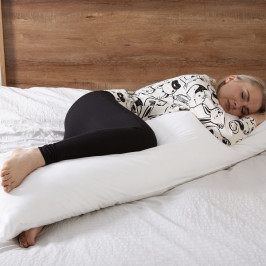How To Sleep Better: An Expert View
Getting a good night's sleep is crucial for overall health and well-being. It plays a vital role in the body's ability to repair and regenerate, impacting various facets of our lives, including physical, mental, and emotional aspects.
However, if we have trouble sleeping, it can ruin the rest of our day and potentially cause unhealthy sleep habits going forward.
Whether you find it difficult to stay awake or stay asleep, we've put together a comprehensive guide on how to get a good night's sleep. From potential issues causing sleep disruptions to ways you can improve your health with the right bedding for you, this guide covers it all.
The Science of Sleep
Sleep is a dynamic process that consists of alternating stages, collectively known as sleep cycles. These cycles are divided into two main categories: Non-Rapid Eye Movement (NREM) and Rapid Eye Movement (REM) sleep.
NREM Sleep
- Stage 1: This is the transitional stage between wakefulness and sleep. It lasts a few minutes, during which the individual may experience drowsiness and muscle relaxation.
- Stage 2: This is a slightly deeper stage of sleep, characterised by a decrease in body temperature and heart rate. It makes up a significant portion of the total sleep time.
- Stages 3 & 4 (Slow-Wave Sleep): These stages are collectively referred to as slow-wave sleep. They are characterised by deep, restorative sleep, during which the body performs crucial repair and rejuvenation.
REM Sleep
REM sleep is a stage where vivid dreaming occurs. Contrary to its name, the eyes move rapidly under closed eyelids. This stage is associated with heightened brain activity, resembling a state of wakefulness. It is crucial for cognitive functions like memory consolidation and emotional regulation.
Importance of quality sleep
Prioritising quality sleep is essential for a vibrant, balanced, and thriving life. Understanding the science of sleep, including its various stages, underscores its immense importance for physical and mental health.
But how does sleep impact these important aspects?
Physical health
Adequate sleep, especially during the deep stages, facilitates the release of growth hormones, aiding in tissue repair, muscle growth, and overall physical rejuvenation.
Additionally, quality sleep strengthens the immune system, allowing the body to combat infections and illnesses effectively. These factors are essential for maintaining optimal physical health and well-being.
Mental health
Quality sleep plays a pivotal role in mental health.
During REM and slow-wave sleep, crucial processes like memory consolidation, learning, and problem-solving occur, contributing to optimal cognitive function. Moreover, quality sleep helps stabilise mood and emotional well-being, reducing the risk of mood disorders like depression and anxiety.
Optimal performance
In terms of performance, proper sleep enhances attention, focus, and overall cognitive abilities, leading to improved performance in daily activities and tasks. Additionally, quality sleep fosters creativity and innovation by allowing the brain to process information and form novel connections.
Emotional well-being
Emotionally, sleep significantly impacts well-being. It acts as a natural stress reliever, reducing the production of stress hormones like cortisol and promoting a sense of calm.
This, in turn, contributes to a positive outlook on life, making it easier to cope with challenges and maintain a healthy perspective. Prioritising quality sleep is essential for a vibrant, balanced, and thriving life.
Common sleep problems
Knowing the science behind sleep is all good and well, but it's common to experience a few disruptions to your sleep every so often. To help you navigate these challenges, here is a brief outline of common sleep problems and their potential impact on overall well-being:
Insomnia
Insomnia is characterised by difficulty falling asleep, staying asleep, or both. It can be short-term (acute) or long-lasting (chronic).
Symptoms include:
- Daytime fatigue
- Reduced concentration
- Irritability
- Mood disturbances
- It may also contribute to long-term physical and mental health issues if left untreated
Sleep apnea
Sleep apnea is a condition where breathing repeatedly stops and starts during sleep. It is often caused by a partial or complete blockage of the upper airway.
Symptoms include:
- Loud snoring
- Disrupted sleep
- Daytime sleepiness
- It is associated with an increased risk of cardiovascular problems, including high blood pressure, heart disease, and strokes.
Restless Leg Syndrome (RLS)
RLS is a neurological disorder characterised by an uncontrollable urge to move the legs, often due to discomfort or unpleasant sensations.
Symptoms include:
- Difficulty falling asleep and staying asleep
- Daytime fatigue and irritability
- It can significantly disrupt the overall quality of sleep.
Narcolepsy
Narcolepsy is a neurological disorder that affects the brain's ability to control sleep-wake cycles. It is characterised by sudden, uncontrollable episodes of sleep during the day.
Symptoms include:
- Sudden and unexpected bouts of sleepiness, often at inconvenient times. This can be dangerous when alertness is crucial, such as when driving.
Sleep disorders in children
Children can experience various sleep disorders, including night terrors, sleepwalking, and bedwetting, which can disrupt their sleep patterns.
These disorders can lead to disrupted sleep for both the child and the parents, potentially impacting daytime functioning and behaviour.
Parasomnias
Parasomnias are abnormal behaviours or movements that occur during sleep. This can include sleep talking, sleepwalking, night terrors, and sleep-related eating disorders.
This can lead to poor sleep quality and may cause disturbances in daily functioning due to unusual sleep-related behaviours.
How to improve sleep
Now that we've recognised some of the issues many of us face when trying to sleep, what are some ways we can get good quality sleep?
A restful environment is crucial for achieving good sleep. Here are a few tips on optimising bedroom conditions to help you get a good night's rest:
1. Temperature regulation
If you tend to overheat during the night, try keeping your room cool. Temperatures typically between 15-19°C (60-67°F) promote thermoregulation, allowing your body to cool down. Bedding, like cooling mattress toppers, can help regulate your body temperature, ensuring a more comfortable and restful sleep experience.
2. Lighting control
Prevent exposure to bright lights, especially in the hour before bed. This includes limiting screen time on electronic devices, as the blue light emitted can suppress the production of melatonin, a hormone essential for sleep.
3. Invest in quality bedding
Choose a comfortable mattress and pillows that support your body's natural alignment. Opt for breathable, moisture-wicking fabrics for your sheets and covers.
Additionally, consider high-quality duvets and mattress toppers that provide an extra layer of comfort and insulation, ensuring you have the best possible sleep environment. This investment in bedding can make a significant difference in the quality of your sleep.
4. Minimise noise disruption
Consider earplugs to buffer disruptive sounds or use soothing, consistent sounds like rainfall or ocean waves to drown out irregular noise.
Investing in a calming sound app on your phone can also provide a consistent background noise that helps mask sudden disturbances, promoting a more serene sleep environment. These measures can greatly improve your chances of uninterrupted, restful sleep.
5. Maintain cleanliness & organisation
A clutter-free, well-organised space fosters a sense of calm and relaxation. Keep personal items and distractions at bay to cultivate a serene atmosphere.
Consider using storage solutions like shelves or baskets to keep items neatly tucked away, allowing for an uncluttered and tranquil sleep environment. Additionally, regular cleaning and tidying can contribute to a fresh, inviting atmosphere that encourages a peaceful night's rest.
6. Control external stimuli
Ensure that your bedroom is primarily reserved for sleep and intimacy. Avoid working, watching TV, or engaging in stimulating activities in bed/before going to bed, as this can condition your brain to associate the space with wakefulness.
7. Promote natural airflow
Regularly ventilate your bedroom to ensure a fresh, oxygen-rich environment. Consider using a fan or opening a window, if possible.
You can also invest in breathable bedding, like the Snuggledown Bliss Memory Foam Pillow, to further optimise air circulation. This innovative pillow design encourages natural airflow, dispersing excess heat and moisture for a more comfortable sleep experience.
By prioritising ventilation and breathable bedding, you create an oxygen-rich environment that promotes deep, rejuvenating rest.
8. Select relaxing colours & decor
Opt for soothing, neutral colours on walls and bedding. Soft blues, greens, or earth tones can promote a tranquil atmosphere conducive to sleep. Consider incorporating elements of nature, such as potted plants or landscape artwork, to enhance the calming ambience.
These natural elements can evoke a sense of serenity, complementing the chosen colour palette. Additionally, minimise stimulating or busy patterns in your decor, opting for simplicity and harmony in your design.
9. Mindful aromatherapy
Use calming scents like lavender, chamomile, or eucalyptus through essential oils or diffusers to promote relaxation. The power of aromatherapy can be a gentle yet effective way to prepare both your mind and body for a good night's rest, making it a valuable addition to your bedroom.
Establishing a bedtime routine
Once you've created a healthy environment, a consistent sleep schedule becomes key to ensuring your body and mind are primed for restorative sleep each night. It reinforces your natural circadian rhythms, making it easier to fall asleep and wake up feeling refreshed.
If you're unsure how to structure your bedtime routine, we've put together a few steps you can take each night:
- Set a consistent bedtime that allows for 7-9 hours of sleep
- Begin winding down at least an hour before your intended bedtime. Engage in calming activities to signal to your body that it's time to relax
- Limit screen time
- Practice relaxation techniques like deep breathing, progressive muscle relaxation, or gentle stretching exercises
- Steer clear of caffeine, nicotine, and other stimulants in the hours leading up to bedtime
- Read or listen to calming music
- Maintain a consistent wake-up time, even on weekends. This helps regulate your body's internal clock.
- Avoid late heavy meals that may cause discomfort or indigestion.
By following these steps and maintaining a regular routine, you can optimise your chances of falling asleep easily. Remember, consistency is key to reaping the full benefits of a bedtime routine.
The role of diet & exercise
Diet and physical activity play significant roles in determining the quality of our sleep. A balanced diet, rich in essential nutrients like magnesium, calcium, and specific B vitamins, supports relaxation and better sleep.
Additionally, avoiding stimulants like caffeine, especially in the later hours, can contribute to improved sleep quality. A well-balanced diet also helps stabilise blood sugar levels, preventing fluctuations that may disrupt sleep.
Regarding exercise, regular physical activity aids in regulating circadian rhythms, synchronising your body's internal clock with the day-night cycle. This, in turn, promotes better sleep. Furthermore, exercise triggers the release of endorphins, reducing stress and anxiety, which can calm the mind before you go to bed.
Sleep position & health
The position in which you sleep can significantly impact your overall health and well-being.
Each sleep position comes with its own set of pros and cons. Here, we'll discuss the various sleep positions and their effects on health, including their potential benefits for snoring and sleep apnea:
Back sleeping:
Back sleeping, also known as the supine position, refers to lying flat on your back with your arms at your sides or resting on your stomach. This sleep position has both advantages and disadvantages.
Pros:
- Spinal alignment: Sleeping on your back can promote proper spinal alignment, reducing the risk of back and neck pain.
- Minimised wrinkles: It minimises the likelihood of developing sleep wrinkles and pressure points on the face.
Cons:
- Snoring & sleep apnea: Back sleeping may worsen snoring and symptoms of sleep apnea for some individuals, as gravity can cause the tongue and soft tissues in the throat to collapse backwards.
Side sleeping:
Side sleeping, also known as the lateral position, involves lying on one's side with the torso and legs relatively straight.
Pros:
- Reduced acid reflux: Sleeping on your left side can help alleviate symptoms of acid reflux by keeping the oesophagus elevated above the stomach.
- Improved breathing: Side sleeping can open up airways, reducing the likelihood of snoring and improving breathing, especially for individuals with sleep apnea.
Cons:
- Potential for wrinkles: Continuous pressure on one side of the face can contribute to the formation of wrinkles over time.
Fetal position:
The fetal position is a popular sleep position where a person curls their body into a compact, rounded shape, resembling the posture of a fetus in the womb. This position is characterised by lying on one's side with the legs bent and the upper body slightly curled forward.
Pros:
- Reduced snoring: Curling up in the fetal position can help reduce snoring, as it opens the airways.
Cons:
- Potential for joint pain: A tightly curled fetal position may lead to joint discomfort and stiffness, especially if sustained throughout the night.
Stomach sleeping:
Stomach sleeping, also known as the prone position, involves lying flat on your stomach with your head turned to one side.
Pros:
- Reduced snoring: Some individuals find that sleeping on their stomach can help reduce snoring.
Cons:
- Neck & back strain: This position can strain the neck and lower back due to the head being turned to one side and the back being arched.
Freefall position:
The freefall position is a sleep posture characterised by lying face down on the bed with the arms extended forward and the head turned to one side.
Pros:
- Reduced snoring: This position may reduce the likelihood of snoring for some individuals.
Cons:
- Potential for neck & back strain: The head is turned to one side in this position, which may lead to neck strain over time.
While there are benefits and drawbacks to each sleep position, individual comfort and health considerations should guide your choice. For those with specific health concerns like snoring or sleep apnea, it's worth trying different positions to see what works best. You can also use pillows for back support and comfort to enhance the benefits of your chosen sleep position.
Ultimately, the goal is to find a position that allows for restful and rejuvenating sleep while minimising any potential negative effects on your health.
Caffeine & sleep
Caffeine, a stimulant found in coffee, tea, and certain energy drinks, can significantly affect sleep patterns. It works by blocking adenosine, a neurotransmitter which promotes sleep and relaxation.
Effects of caffeine on sleep include
- Delayed sleep onset: Consuming caffeine, especially in large quantities or later in the day, can lead to difficulty falling asleep.
- Reduced sleep quality: Even if you do manage to fall asleep after consuming caffeine, the quality of your sleep may be compromised. You may experience more frequent awakenings and lighter, less restful sleep.
- Shortened total sleep time: Caffeine can lead to a reduction in the total amount of sleep obtained, leaving you feeling less refreshed upon waking.
How to limit caffeine intake
- Avoid Caffeine in the afternoon and evening
- Pay attention to how it affects your sleep
- Opt for decaffeinated beverages, especially in the hours leading up to bedtime.
- Replace caffeinated beverages with water to stay hydrated without the stimulating effects.
Alcohol & sleep
Much like caffeine, alcohol can also cause disruptions to your sleep.
Effects of alcohol on sleep:
- Disrupted sleep patterns: While alcohol may help you fall asleep faster, it disrupts the natural progression of sleep cycles, leading to fragmented and less restorative sleep.
- Increased wakefulness: Alcohol can lead to more awakenings during the night, reducing overall sleep efficiency.
- Suppressed REM sleep: REM (Rapid Eye Movement) sleep, crucial for cognitive function and mood regulation, can be suppressed, leading to impaired memory and concentration.
Guidance on responsible alcohol consumption:
- Limit alcohol intake before bed
- If you choose to consume alcohol, do so in moderation. Avoid excessive or binge drinking, as it can have more pronounced negative effects on sleep.
- Balance alcohol consumption with water to stay hydrated
- Observe Individual Tolerance. If you notice disruptions, consider adjusting your consumption.
Remember, individual responses to caffeine and alcohol can vary. Being mindful of how these substances affect your sleep is crucial for optimising your rest and overall well-being.
Technology & sleep
The pervasive use of technology has brought about significant shifts in our sleep habits. Understanding the impact of screens, blue light, and electronic devices on sleep quality is crucial for cultivating healthy sleep hygiene.
Impact of screens and electronic devices
- Blue light emission: Screens emit blue light, which mimics the effects of natural sunlight. Exposure to this type of light in the evening can suppress the production of melatonin, a hormone that regulates sleep-wake cycles.
- Stimulation & alertness: Engaging with screens, especially in stimulating activities like browsing social media or playing video games, can increase mental alertness and make it harder to wind down for sleep.
- Delayed sleep onset: The mental engagement with screens can lead to a delay in the onset of sleep, as it takes time for the mind to transition from an active state to a more relaxed one.
Expert advice on limiting screen time before bed
- Set a specific time in the evening, ideally at least an hour before bed, to power down electronic devices. This allows your mind to naturally wind down
- Consider using blue light filter applications or features on your devices
- Opt for "night mode" or "dark mode" on devices
- Read physical books over an e-reader or tablet for bedtime reading
- Opt for calming activities like meditation, gentle stretches, or listening to calming music instead of screen-based entertainment.
- Charge your devices in a different room, if possible. This discourages late-night scrolling and ensures that your bedroom remains a screen-free zone.
Stress & sleep
Stress and sleep are intricately linked, with high stress levels often leading to sleep disturbances. Here are a few ways stress can impact your sleep:
- Stress hormones: High-stress situations trigger the release of stress hormones like cortisol and adrenaline. Elevated levels of these hormones can lead to heightened alertness and difficulty in winding down for sleep.
- Racing thoughts: Stress often brings about racing thoughts and a hyperactive mind. This mental activity can make it challenging to relax and fall asleep.
- Physical tension: Chronic stress can result in physical tension and muscle stiffness, making it uncomfortable to get into a relaxed sleep position.
Stress management strategies:
- Mindfulness & meditation: Engage in mindfulness practices, such as meditation or deep breathing exercises. These techniques promote a calm and centred state of mind, making it easier to transition into a restful sleep.
- Progressive Muscle Relaxation (PMR): PMR involves systematically tensing and relaxing different muscle groups. This practice can help release physical tension, promoting a state of relaxation.
- Regular exercise: Engage in regular physical activity, as it helps reduce stress levels. Exercise triggers the release of endorphins, which are natural mood lifters that can counteract the effects of stress on sleep.
- Establishing a bedtime routine: A consistent pre-sleep routine helps signal to your body that it's time to wind down. Engaging in calming activities like reading or gentle stretches can prepare your mind and body for restful sleep.
- Journaling: Write down any worries or thoughts that may be keeping you awake. Putting these concerns on paper can help clear your mind and alleviate stress.
- Seeking social support: Connect with friends, family, or a support group. Sharing your concerns and seeking support can provide emotional relief and help reduce stress levels.
- Professional Guidance: Consider seeking help from a therapist or counsellor if stress significantly impacts your sleep and overall well-being. They can provide tailored strategies and support.
Ageing & sleep
As individuals age, their sleep patterns and needs naturally evolve. Understanding these changes can help seniors adopt habits that promote healthy and restorative sleep. Here's how sleep patterns tend to shift with age:
- Reduced deep sleep: Older adults often experience a decrease in deep, slow-wave sleep, which is essential for physical restoration and memory consolidation.
- More fragmented sleep: Seniors may experience more awakenings during the night.
- Shift in circadian rhythms: The circadian rhythm, which regulates the sleep-wake cycle, may shift, leading to earlier bedtimes and earlier wake times.
- Decreased melatonin production: Melatonin may be produced in smaller quantities, potentially affecting sleep quality.
Recommendations for healthy sleep in seniors:
- Establish a consistent sleep schedule
- Create a relaxing bedtime routine
- Create a pleasant sleep environment
- Use comfortable bedding
- Limit stimulants and heavy meals before bed
- Stay active
- Manage stress
- Limit naps
- Consult a healthcare professional If sleep problems persist or significantly impact your quality of life.
Napping strategies
Napping strategically can offer several benefits, including increased alertness, improved mood, and enhanced cognitive performance.
However, it's important to nap in a way that complements your regular sleep schedule and doesn't disrupt your nighttime rest. Here are some tips for taking short, rejuvenating naps:
Keep it short
Aim for naps that last between 10 to 20 minutes. This duration is sufficient to boost alertness without causing grogginess.
Choose the right time
Plan your nap earlier in the day, ideally in the late morning or early afternoon. Napping too late in the day may interfere with your ability to fall asleep at night.
Create a comfortable environment
Find a quiet, dimly lit space where you can relax without disruptions. Consider using a comfortable pillow and blanket.
Set an alarm
Establish a specific duration for your nap and set an alarm to ensure you don't oversleep. This helps maintain the effectiveness of the nap without encroaching on nighttime sleep.
Avoid caffeine before napping
Refrain from consuming caffeine before a nap, as it may interfere with your ability to relax and fall asleep.
Limit nap frequency
While strategic napping can be beneficial, frequent or long naps throughout the day can disrupt your nighttime sleep schedule. Try to limit naps to one per day.
Use naps to combat afternoon slump:
If you experience a natural dip in alertness in the afternoon, a short nap can help re-energize you and improve productivity.
Consider a power nap
A power nap of around 10 minutes can provide a quick burst of energy and alertness, making it an ideal option for a mid-day boost.
Listen to your body
Pay attention to your body's signals. If you're feeling excessively tired, a short nap can be a valuable tool for recharging.
Remember, while strategic napping can offer benefits, it's important to strike a balance. Regular, quality nighttime sleep remains the cornerstone of overall well-being. Napping should complement your nighttime sleep schedule rather than serve as a substitute for it.
Sleep medicine & supplements (if applicable)
While natural sleep aids and supplements can sometimes offer support in improving sleep quality, it's essential to approach them with caution and consult a healthcare professional before use. Here are some insights into their potential benefits:
- Melatonin: Melatonin is a hormone naturally produced by the body that regulates sleep-wake cycles. As a supplement, it can benefit individuals with circadian rhythm disruptions, such as shift workers or those with jet lag.
- Valerian root: Valerian is an herbal supplement known for its calming properties. Some studies suggest it may improve sleep quality, but its effectiveness can vary from person to person.
- Magnesium: This essential mineral plays a role in relaxation and muscle function. Some individuals with low magnesium levels may benefit from supplementation, although it's important to have levels checked before starting.
- Lavender & chamomile: Essential oils from lavender and chamomile are often used in aromatherapy for their calming effects. They can be used in diffusers or as part of a pre-sleep relaxation routine.
Importance of consulting a healthcare professional
Knowing when to consult a healthcare professional or sleep specialist is crucial for addressing persistent sleep issues. If you experience chronic insomnia, excessive daytime sleepiness, or any underlying medical conditions impacting your sleep, seeking professional guidance is advisable.
Additionally, if self-implemented strategies do not yield significant improvements over time, it's a strong indication that expert input is needed.
Sleep aids and supplements are not one-size-fits-all. A healthcare professional can assess your specific sleep issues, medical history, and any potential interactions with medications or existing health conditions to prescribe you the right supplements.
When seeking help, start by consulting your primary care physician. They can assess your situation, provide initial recommendations, and refer you to a specialist if necessary. For specific sleep disorders or complex cases, consider seeking out a board-certified sleep medicine specialist or a neurologist with expertise in sleep disorders.
Consulting a healthcare professional ensures that any chosen interventions are tailored to your specific needs and circumstances, ultimately promoting safer and more effective solutions for better sleep.
Get to sleep with Sleepseeker
With this guide, our team at Sleepseeker hopes you can acquire healthy sleep habits that can help you feel better. Elevate your sleep experience with our premium range of mattress protectors, duvets, pillow protectors and electric blankets.
For personalised guidance and expert advice, visit our blog for more insightful articles or contact us now for more details.
What's trending now...
-

Slumberdown Super Support Firm Support Side Sleeper Pillow, 2 Pack
£17.00
Shop Now -

Slumberdown All Seasons Combi 15 Tog (10.5 + 4.5 Tog) Double Duvet
£30.50
Shop Now -

Slumberdown Paws for Slumber Olive Green Pet bed, Medium
£39.00
Shop Now -

Slumberdown Wonderful Wool Mattress Topper
From: £54.50
Shop Now -

Slumberdown Paws for Slumber Extra Large Pet Bed Spare Cover, Grey
£20.00
Shop Now -

Snuggledown Scandinavian Hollowfibre Pillow Protector - Pack of 2
£15.00
Shop Now -

Slumberdown Waterproof Mattress Protector - Double
£17.50
Shop Now -

Snuggledown Intelligent Warmth Heated Topper - King
£125.00
Shop Now -

Slumberdown Paws For Slumber Sherpa Pet Bed, Medium
From: £25.00
Shop Now -

Slumberdown Unwind Outside 2-in-1 Waterproof Cocoon Set, Burnt Orange
£30.00
Shop Now -

Slumberdown Super Support Firm Support Side Sleeper Pillow
From: £17.00
Shop Now -

Slumberdown All Seasons Combi Duvet
From: £25.50
Shop Now -

Slumberdown Paws for Slumber Medium Pet Bed
From: £39.00
Shop Now -

Slumberdown Wonderful Wool Mattress Topper, Double
£54.50
Shop Now -

Slumberdown Paws for Slumber Extra Large Pet Bed Spare Cover
From: £20.00
Shop Now -

Snuggledown Scandinavian Hollowfibre Pillow Protector
From: £15.00
Shop Now -

Slumberdown Waterproof Mattress Protector
From: £16.00
Shop Now -

Snuggledown Intelligent Warmth Heated Topper
From: £110.00
Shop Now -

Slumberdown Unwind Outside 2-in-1 Waterproof Cocoon Set
From: £30.00
Shop Now -

Slumberdown Body Support Pillow, 1 Pack, Includes 100% Cotton Pillow Case
£20.00
Shop Now -

Slumberdown All Seasons Combi 15 Tog (10.5 + 4.5 Tog) King Size Duvet
£34.00
Shop Now




